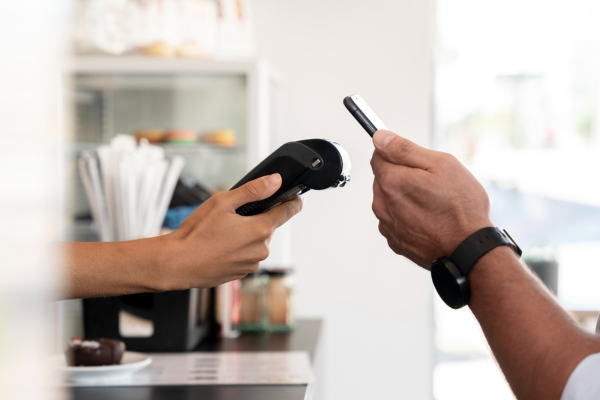
According to Pordata, there are around one and a half million SMEs (Small and Medium-sized Enterprises) in Portugal, a number that makes this type of company central to the functioning of the national economy.
A smaller size means a smaller number of clients and a smaller turnover compared to the larger companies in our market, but this does not mean that their needs should be overlooked or minimised, since most of the Portuguese population depends on these companies.
These needs include payment solutionsThis is essential at a time when consumer habits are changing and becoming more digital.
The importance of digital payments for small businesses
As a general rule, low turnover and limited financial capacity to make investments means that small businesses need payment methods agile, simple and, above all, low-cost.
These are more than enough reasons for this type of business to opt, or should opt, for digital payments, especially now that it is possible to find on the market payment terminals which, in addition to being annuity-free and commission-free, allow access to the payment methods most used by consumers and adapt to the very nature of the company.
At REDUNIQ, for example, small businesses find the REDUNIQ EasyA terminal with a monthly fee according to business turnover, specially designed for companies with a low turnover and/or which only operate on a seasonal basis, and which have no loyalty period, minimum revenue or commission payments.
With this fee-free payment terminalThe business can also benefit from cashless payments simplified, through PIN or Contactless with national and international credit and debit cards, MB WAY and functionality DCC - Currency Conversion that will allow you to receive payments in the customer's home currency in a simple way.
Flexible payments: options to attract more customers
In line with the above, the customer's purchasing journey, even in small businesses, will ultimately be favoured if the company offers consumers a range of payment methods that match their consumption habits.
In Portugal, in addition to cash payments, which, despite strong competition, are still the most popular, the contactless card paymentsas the Bank of Portugalinstant transfers and MB WAY already account for a significant percentage of the face-to-face payments.
In addition to these, it is important not to neglect the Portuguese appetite for digital wallets which are gradually making their way as a valid payment option for many consumers.
So, not only to attract more customers, but also to increase sales volume, it is becoming increasingly important for a small business to invest in payment methods that allow it to tap into a greater number of payment methods, including digital wallets for local and national businesses.
This is the case with the Android terminal REDUNIQ Smart and the app REDUNIQ Soft, which allow you to accept:
- REDUNIQ Smart - payments with cardby Contactless, PIN, MB WAY, QR Code, Google Pay, Apple Pay and the integration of applications that will be the key to entering the universe Parcela Já com UNICRE;
- REDUNIQ Soft - payments with national cards and the main international brands, with Contactless, chip, MB WAY, Apple Pay e Google Pay.
It should be emphasised that the REDUNIQ Soft solution is, in practice, an application that, once integrated into the company's smartphone turns it into a real payment terminal capable of accepting transactions at any time or place, thus favouring innovation in digital payments and business mobility.
Mobility is undoubtedly one of the current trends in payments, but will this continue in 2025? That's what we'll see in a moment.
Innovations in payment methods: what to expect in 2025?
Among the payment trends for 2025, we can expect:
-
Payment in instalments
More than 400 million people around the world, with Brazil, the US and China leading the way, already regularly use the payment instalments in their daily shopping and estimates tell us that this number will increase.
According to Fortune Business Insights, this feature, which allows consumers to buy what they need and pay for it in interest-free instalments, is expected to generate something like 37.19 billion dollars this year and record an average growth of 18 billion euros by 2025.
Unlike until the beginning of 2024, Portugal will be able to contribute to this figure thanks to the solution Parcela Já com UNICREwherebusinesses will be able to offer their customers the option of paying for their purchases in 2 to 6 interest-free instalments, but receive the full amount of the purchase immediately.
This instalment payments for all types of businesses is extremely interesting, as it promotes trust and brings the company closer to its customers.
-
Increasing weight of contactless payments in business turnover and volume of transactions
In order to understand future trends, it is advisable to look at how certain payment methods have evolved over the last few years. The contactless payments are a prime example of this.
With democratising access to contactless payment methods by consumers and, it has to be said, by the action of the Bank of Portugal to demand that, as of 2022, all bank cards issued have contactless functionality installed and businesses have at least one payment terminal (POS) capable of accepting this type of payment. contactless technology has established itself as the real alternative to cash payments.
Although there is no data for 2024, Banco de Portugal's Payment Systems Report for 2023 shows that, of the 11.6 million daily payments made in Retail, 53% of them were made using contactless cards, an increase of 31.1% in quantity and 32.7% in value when compared to 2022.
To get a sense of the scale of the evolution of this payment method, it should be noted that in 2019, contactless payments accounted for only 8% of retail transactions.
Given this data, it's safe to say that the contactless payments for 2025 will break new records and give rise to the creation of payment terminals even more digital and mobile, as in the case of REDUNIQ Soft, which, as we have seen, a application that turns the retailer's smartphone into a real POS.
-
Euro Digital
In addition to everything we already know about cryptocurrencies and their influence on the world of payments, 2025 will bring a major innovation for countries like Portugal that use the Euro: the launch of the public pilot phase of the Euro Digitalthe single digital currency that promises to revolutionise the way payments are made and accepted in the Eurozone.
-
Biometrics
Until now, biometric technology has mainly been used to authenticate identity when accessing certain technologies or physical spaces.
By 2025 this could change, once the security and convenience offered by biometrics becomes a popular form of payment.
Whether through fingerprints or facial recognition, biometrics is set to enter the world of payment technologies in commerce in a big way.
How can you prepare your business for payment trends in 2025?
In view of the current consumer trendsThe best advice we can give a small business is to first realise what its needs and realistic growth prospects are.
After this analysis, it is important to analyse your invoicing and try to understand where it comes from and what type of payment methods your customers use the most.
With this data on the table, look for a TPA that allows you to match your customers' preferences with the average ticket (average amount spent on each purchase) and the level of turnover you want to achieve.
Finally, compare all this data and look through our options of physical payment or online payment the solution that best fits the nature of your business and the profile of your client.


